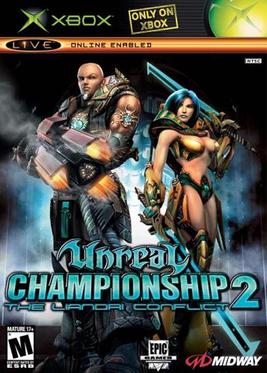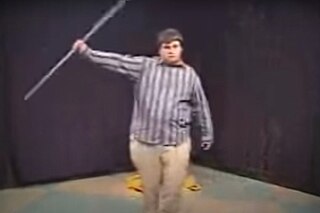
Unreal Tournament is a first-person arena shooter video game developed by Epic Games and Digital Extremes. The second installment in the Unreal series, it was first published by GT Interactive in 1999 for Windows, and later released on the PlayStation 2 and Dreamcast by Infogrames in 2000 and 2001, respectively. Players compete in a series of matches of various types, with the general aim of out-killing opponents. The PC and Dreamcast versions support multiplayer online or over a local area network. Free expansion packs were released, some of which were bundled with a 2000 re-release: Unreal Tournament: Game of the Year Edition.

Unreal Tournament 2003 is a first-person arena shooter video game developed by Epic Games and Digital Extremes, and published by Infogrames under the Atari brand name. The game is part of the Unreal franchise, and is a sequel to 1999's Unreal Tournament. Like its predecessor, the game is designed mainly for multiplayer gaming.

Cliff Bleszinski, popularly known as CliffyB, is an American video game designer, known for his work on the Unreal and Gears of War series while at Epic Games. After leaving Epic in 2012, he co-founded Boss Key Productions in 2014 which closed in 2018 after the commercial failure of the multiplayer shooter LawBreakers. Since Boss Key's closure, Bleszinski has spent his time with theater and writing.

The "Dancing Baby", also called "Baby Cha-Cha" or "the Oogachacka Baby", is an internet meme of a 3D-rendered animation of a baby performing a cha-cha type dance. It quickly became a media phenomenon in the United States and one of the first viral videos in the mid-late 1990s.

Unreal Championship 2: The Liandri Conflict is a first- and third-person arena shooter video game developed by Epic Games and published by Midway Games. It was released in April 2005 for Xbox. The game is part of the Unreal franchise, and is a direct sequel to 2002's Unreal Championship. Unreal Championship 2 was designed from the ground up to take full advantage of the Xbox Live gaming service.

"Numa Numa" is an Internet meme based on a video by American vlogger Gary Brolsma made after the song "Dragostea Din Tei" as performed by Moldovan pop group O-Zone. Brolsma's video, entitled "Numa Numa Dance", was released on December 6, 2004, on the website Newgrounds under the username "Gman250" and shows Brolsma lip-syncing the song with lively gesticulations and dance moves. The video title is derived from the Romanian words "nu mă nu mă" that occur in the refrain of O-Zone's song. It was the first Numa Numa-themed video to gain widespread attention.

Computer rage refers to negative psychological responses towards a computer due to heightened anger or frustration. Examples of computer rage include cursing or yelling at a computer, slamming or throwing a keyboard or a mouse, and assaulting the computer or monitor with an object or weapon.

Bad Day is a 27-second viral video where a frustrated office worker assaults his cubicle computer. It has circulated virally online since 1997. The video became a cultural embodiment of computer rage, and is the subject of several parodies and ad campaigns.

Unreal Tournament 3 (UT3) is a first-person arena shooter video game developed by Epic Games and published by Midway Games. Part of the Unreal franchise, it is the fourth game in the Unreal Tournament series, and the eighth and final game overall; its name is in reflection of the game being the first in the franchise to use Unreal Engine 3. It was released on November 19, 2007, for Microsoft Windows, December 10 for the PlayStation 3, and on July 3, 2008, for the Xbox 360. OS X and Linux ports were planned, but they were eventually cancelled. A free-to-play version, entitled Unreal Tournament 3 X, was leaked in late 2022 and cancelled in 2023.

Don't Copy That Floppy was an anti-copyright infringement campaign run by the Software Publishers Association (SPA) beginning in 1992.

Leeroy Jenkins is a player character created by Ben Schulz in Blizzard Entertainment's multiplayer online video game World of Warcraft.

Star Wars Kid is a viral video made in 2002 by Ghyslain Raza in which he wields a golf ball retriever in imitation of Darth Maul's lightsaber moves from the film Star Wars: Episode I – The Phantom Menace. At the time, Raza was a 15-year-old high school student from Trois-Rivières, Quebec, Canada. He had not intended for the video to become public, but its subsequent release led to ridicule, during which Raza chose to distance himself from the video. Raza has since affirmed his identity and has used the video to help to speak on the effects of bullying and harassment.

Keyboard Cat is a video-based internet meme. Its original form was a video made in 1984 by Charlie Schmidt of his cat Fatso seemingly playing a musical keyboard to a cheery tune. While Schmidt had uploaded the video himself to YouTube in 2007, Brad O'Farrell, with Schmidt's permission, appended the video to the end of a blooper video uploaded in 2009 as if to have the cat "play" the person offstage after the gaffe as they had done in Vaudeville. The idea of this quickly expanded on the Internet by numerous other users, typically under the name "Play Him Off, Keyboard Cat", and became a popular meme on YouTube.

Techno Viking is an internet phenomenon or meme based on a video from the 2000 Fuckparade in Berlin, Germany.
Steven Polge is a game programmer, most noted for his work on Epic Games' Unreal series of games. Polge was hired by Epic in 1997 after creating the Reaper Bot, which is recognized by Guinness World Records as the first computer-controlled deathmatch opponent. In addition to programming on the franchise, he served as lead designer on Unreal Tournament 3, and has been credited on other Epic titles such as Gears of War, Shadow Complex and Fortnite.














